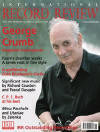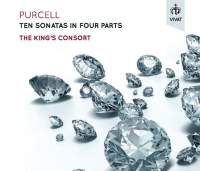Texte paru dans: / Appeared in: |
|
|
Reviewer: Marc
Rochester With this latest release on its own Vivat label, The King's Consort competes head‑to-head with what could be described as its alter ego. When, in 2009, Robert King reclaimed his ensemble from Matthew Halls, who had directed it during King's absence from the musical scene, several members decided te stay with Halls and form themselves into a new ensemble, while others continued with The King's Consort under its eponymous director. The first recording from Halls and his newly named Retrospect Ensemble was of these ten Purcell Sonatas in Four Parts on the Linn label, and a very impressive recording debut it was too. Revisiting,that disc I can well see what all the fuss was about, and it still has the power to force me to stop whatever I am doing and sit in open‑mouthed admiration at their astonishingly perceptive and arresting performances of this music; which is not to say that King and the four other players on this disc do not have something, very distinctive to offer.
It's not an age thing. Having just celebrated my own sixtieth birthday, I am the first to dismiss the woefully misguided perception that younger people have greater mental energy and vitality (it's just that those of us of a more mature vintage have learnt to ponder at leisure rather than act impetuously) and, in any case, judging from the booklet photographs, the collective ages of the two ensembles do not seem to differ significantly. But while the Retrospect performances ‑have a wonderful ‑ some would say youthful freshness about them, The King's Consort offers a much mellower and considerably less excitable view.
Part of that may be down to the addition of Lynda Sayce's theorbo to the continuo contingent of bass viol (Susanne Heinrich) and keyboard (King); the Retrospect players confined their continuo to a bass viol and keyboard. The theorbo certainly gives a more solid and weighty feel, keeping the feet of the whole ensemble firmly on the ground and helping to create a rich expansiveness to some of the slower sections (most especially the pastoral‑like opening of the E flat Sonata, Z803). The violins of Cecilia Bernardini and Huw Daniel are totally assured in their technical prowess and musical insight, yet seem to take it all in a more measured manner than their counterparts in the newer ensemble, leaving the energetic outbursts of the dance passages (as with the Canzona from the D major Sonata, Z811) to the bass viol. That said, they dazzle with glittering virtuosity in the mighty Chaconne which constitutes the G minor Sonata, Z807, and ooze pathos in the gracefully agonized dissonances of the opening Adagio from the D minor Sonata, Z805.
King
himself is an undoubted authority on Purcell, as reveaIed by his varions
performing editions and 1994 biography of the composer, and he has written
an extremely generous booklet note with this disc (if printed in a minuscule
and barely legibly typeface ‑ or is my inability to read it without a
magnifying glass a symptom of my advancing years?). in performance, however,
his interpretations have not always brought Purcell's music convincingly to
life, and heard beside the Retrospect Ensemble's recording, this seems
rather more worthy than compelling. And fine as the Vivat recording is, it
lacks the crisp and vivid immediacy of the earlier Linn disc. |
|
|
|
|
|
Cliquez l'un ou l'autre
bouton pour découvrir bien d'autres critiques de CD |
|




